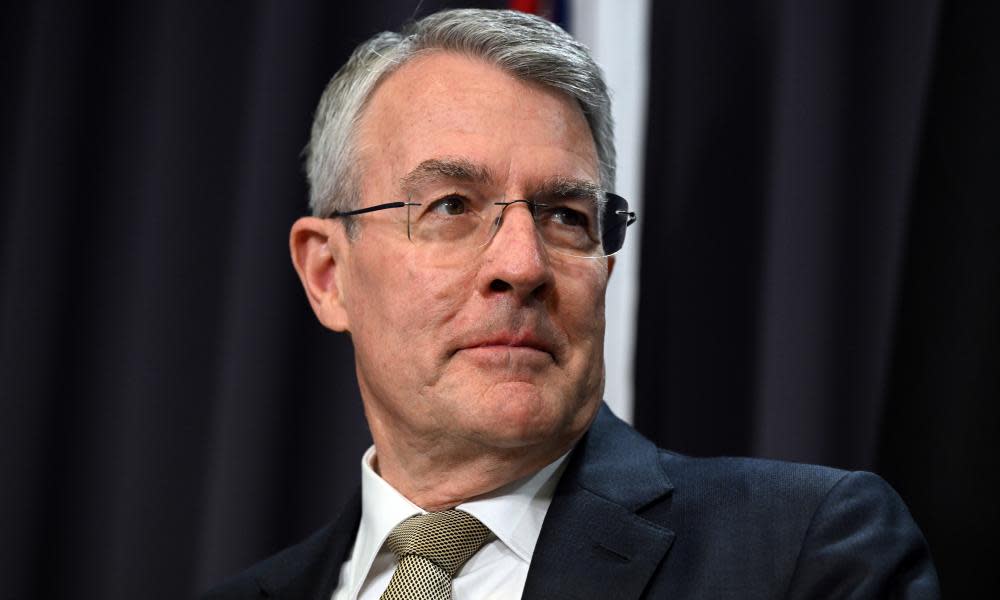Labor’s national anti-corruption commission to hold ‘most’ hearings in private

Labor is facing a backlash from the crossbench over its decision for the national anti-corruption commission to hold “most” of its hearings in private with public hearings limited to “exceptional circumstances”.
The attorney general, Mark Dreyfus, told reporters in Canberra on Tuesday the high bar for public hearings was the “right setting” to avoid “reputational harm”, but did not rule out that it was included at the Liberal opposition’s request.
Although crossbench MPs have praised the inclusion of a power to investigate parties external to government, the privacy of Nacc hearings sets up a fight with the Greens and independents, re-enlivening concerns Labor is attempting to appease the Coalition.
Senators David Pocock, Jacqui Lambie and the Greens – who may have the casting votes in the Senate if Labor does not secure Coalition support – all raised concerns about the bar for public hearings.
The “exceptional circumstances” requirement echoes the Victorian regime, but is a higher bar than in New South Wales, Tasmania, Queensland, the Northern Territory, ACT and Western Australia.
Pocock told Guardian Australia “the independent commission should be able to make hearings public if they believe it is in the public interest, not be constrained to do so [only] in ‘exceptional circumstances’”.
The Greens justice spokesperson, David Shoebridge, warned the bar “ignores the fact that sunshine is a great disinfectant”.
Labor wants the Federal NACC to only be able to have public hearings in “exceptional circumstances” - this is too high a bar and ignores the fact that sunshine is a great disinfectant.
— David Shoebridge (@DavidShoebridge) September 27, 2022
Shoebridge told reporters in Canberra the Greens are concerned “the limitation on public hearings is designed not just to appease the Coalition … but also some of those voices in Labor who have always wanted to limit the reach” of the Nacc.
Lambie said the bar “raised an eyebrow or two” and the Jacqui Lambie Network has now asked the government to explain why it is necessary.
Independent MP, Zali Steggall, said it was a “major red flag” and “could result in very few public hearings”. Independent MP Kate Chaney called for “public hearings whenever it’s in the public interest”.
Transparency campaigner and former judge of the Victorian court of appeal, Stephen Charles, told Sky News the term “exceptional circumstances” was “vague” and had resulted in “comparatively fewer” public hearings in Victoria.
The Centre for Public Integrity chair, Anthony Whealy, said the Coalition’s anti-corruption proposal was “steeped in secrecy” and it “would be a shame if the [Labor] government compromises with the opposition on this point”.
“It will cause those investigated to challenge the decision in court which will require the integrity commission to reveal all of its information publicly before an investigation can be finalised,” he said in a statement.
“This delays investigations and can lead to evidence being interfered with.”
Independent MP Monique Ryan said the “very high bar … could cause delays due to challenges to the investigative process”.
Independent MP Helen Haines was more circumspect, saying she could not comment until she had seen the details in the bill..
Independent MP Zoe Daniel said she didn’t “disagree with a high bar” but would wait to see the definition of exceptional circumstances.
On Friday the Liberal leader, Peter Dutton, confirmed the opposition is talking to the Albanese government “in good faith” regarding the bill, but warned against powers so extensive they could result in “show trials” or “protracted investigations”.
The Nacc bill passed Labor caucus on Tuesday and will be introduced to the House of Representatives on Wednesday. It will then be considered by a joint select committee inquiry before a possible final Senate vote in November.
On Tuesday Dreyfus confirmed the Nacc will have power “to investigate conduct occurring before it was established”.
Asked why the commission would have to consider public hearings both in the public interest and to be required by “exceptional circumstances”, Dreyfus replied that he expects “that most of the hearings conducted by this federal commission, just as for the state and territory commissions … will be conducted in private”.
“We think that is the right setting and it shows that the commission has to take that into account before it decides to hold a public hearing but it will remain a matter for the commissioner to [decide].
“Public hearings, as we have seen, are more difficult to conduct. They raise questions about reputational harm which are not faced when you hold private hearings and that is why most of these commissions’ work has been done in private.”
Dreyfus said Labor would fund the Nacc with $262m over four years, $90m more than Coalition had promised.
He committed to “strong parliamentary oversight” of its funding, including a joint committee able to report on the sufficiency of its budget.

 Yahoo Movies
Yahoo Movies 
